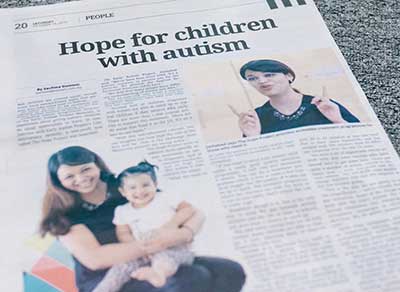
[Feature Article] Malay Mail: Hope For Children with Autism
On the 15th of October, Malay Mail featured an article on Jochebed Isaacs, our director, talking about The Hope Project and what it aims to do.
—
Hope for children with autism
Published in: Malay Mail
Published on: 15th October 2016
Written by: Sachina Dominic

ALL children are created equal, though some have extraordinary traits that parents may take some time to fathom.
As many as one in 68 newborns are affected by autism, according to the National Autism Society of Malaysia.
Jochebed Isaacs, programme director of Early Autism Project Malaysia, is passionate about giving autistic children an equal opportunity to learn. In conjunction with Early Autism Project’s 10th anniversary recently, a non-profit arm called The Hope Project was launched.
On Early Autism Project, Jochebed said, “We’ve been here since 2006. It’s a private company so parents pay for the services. We provide the Applied Behavioural Analysis (ABA) here. We find that may people have different understanding of autism and ABA.”
The 34-year-old, who holds a masters in clinical psychology fro Universiti Kebangsaan Malaysia, said ABA was effective but costly.
“Around half of children diagnosed with autism are able to catch up to typical children if they receive ABA early. There are more than 1,000 journal articles to support this statement. There are 40 states that fund it in the US. It’s on a one-to-one basis. With this individualised concept, you can imagine just how high the cost of the fees will be. That is the challenge most Malaysian parents are facing today.”
The Hope Project aims to address three specific areas: awareness on early diagnosis, lack of national standards, and its high cost that makes it inaccessible for many.
“What we want to do with the project is to make world-class services for autism accessible to al,” said Jochebed. “If you want to enrol your autistic child under a really good quality intensive programme, it will cost you thousands a month. You can do a treatment programme which is free or costs a few hundred ringgit, but the quality of it may not be up to mark. The intensive programme where the teachers are with the child on a one-to-one basis, that’s where the cost is really high.”
Expensive though it is, that is the only way to close the gap between autistic children and the rest of them in schools, and give them a chance to catch up.
She said while autism may not be fully curable, many children are able to manage it well, allowing them to improve drastically over time.
“Autism is a spectrum from mild to moderate to severe. Children can progress to have less and less symptoms of autism, or if they are left untreated, their conditions can worsen over time. The symptoms can get more severe or more minimal depending on how early they start treatment. It is recommended to get your children checked from 18 months onwards.”
The website www.babycenter.com has been set up so parents are able to check if their child is reaching their baby milestones at the recommended time. It is a way of detecting if a child has autism if he or she does not show the normal signs of development.
The Early Autism Project usually works with 30 to 40 children at any one time due to their space limitation, and has worked with 300 children from 30 different countries over the last 10 years.
“We have a lot of expatriates whom we have worked with, and some families who have moved here to get some help. There are quite a number of autism centres in Malaysia now – both non-profit and private centres. The non-profit ones usually charge minimal fees and are targeted at the low-income group. This is the way we are going to run The Hope Project – we’ve already done a few initiatives. Some of the things we’ve done over the years include the World Autism Awareness Day campaigns and acceptance campaigns in schools and churches. We do public presentations as well.”
Aside from campaigns, activities such as organising training workshops and complimentary screenings for families with autistic children are held.
They also have informative, multilingual resources such as videos and flyers.
“What I really want to do is impact special education and education as a whole. I feel that the approach of teaching can be so positive that all kids can learn.”
Jochebed said children in government schools have so much potential, and if teaching methods are changed, it can make a difference.
Although no one in Jochebed’s family is affected by autism, she is passionate about the subject simply because of her upbringing, where her parents brought up her siblings and herself to volunteer and help others.